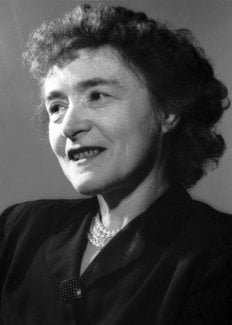Gerty Cori
Biographical

Gerty Theresa Cori, née Radnitz, was born in Prague on August 15th, 1896. She received her primary education at home before entering a Lyceum for girls in 1906; she graduated in 1912 and studied for the University entrance examination, which she took and passed at the Tetschen Realgymnasium in 1914. She entered the Medical School of the German University of Prague and received the Doctorate in Medicine in 1920. She then spent two years at the Carolinen Children’s Hospital before emigrating to America with her husband, Carl, whom she married in 1920. They worked together in Buffalo and when he moved to St. Louis, she joined him as Research Associate. Gerty Cori was made Professor of Biochemistry in 1947.
Carl Ferdinand Cori was born in Prague on December 5th, 1896. His father, Dr. Carl I. Cori, was Director of the Marine Biological Station in Trieste, and it was here that young Carl spent his childhood. He received an early introduction to science from his father and this was stimulated on summer visits to the Tyrol, to the home of his grandfather, Ferdinand Lippich, Professor of Theoretical Physics at Prague. He studied at the gymnasium in Trieste and graduated in 1914 when he entered the German University of Prague to study medicine. During World War I, he served as a lieutenant in the Sanitary Corps of the Austrian Army on the Italian front; he returned to University, where he studied with his future wife, Gerty, to graduate Doctor of Medicine in 1920. He spent a year at the University of Vienna and a year as assistant in pharmacology at the University of Graz until, in 1922, he accepted a position as biochemist at the State Institute for the Study of Malignant Diseases in Buffalo, New York. In 1931, he was appointed Professor of Pharmacology at the Washington University Medical School in St. Louis, where he later became Professor of Biochemistry.
The Cori’s have collaborated in most of their research work, commencing in their student days and stemming from their mutual interest in the preclinical sciences. Their first joint paper resulted from an immunological study of the complement of human serum.
In America, they first studied the fate of sugar in the animal body and the effects of insulin and epinephrine. The presence of glycolysis of tumours in vivo was demonstrated. Their work on carbohydrate metabolism passed from studies of whole animal to isolated tissues and, later, tissue extracts and isolated enzymes, some in crystalline form, were studied. In 1936, they isolated glucose-1-phosphate, «Cori ester», and traced its presence to the activity of the phosphorylase, which catalyzes the breakdown and synthesis of polysaccharides: this discovery made possible the enzymatic synthesis of glycogen and starch in vitro. Subsequently, phosphorylase and other enzymes were crystallized.
The Cori’s have been consistently interested in the mechanism of action of hormones and they have carried out several studies on the pituitary. They observed that the marked decrease in glycogen and lowering of blood sugar in hypophysectomized rats occurred with a concomitant increase in the rate of glucose oxidation. Subsequently, by a study of the action of hormones on hexokinase, they observed that some pituitary extracts inhibit this enzyme in vivo and in vitro and that insulin counteracts this inhibition.
In addition to their own highly original personal work, the Cori’s have always been a source of inspiration to their colleagues at the active centres of biochemical research which they have directed. They have contributed many articles to The Journal of Biological Chemistry and other scientific periodicals.
Carl Cori is a member, and Gerty Cori a late member, of the American Society of Biological Chemists, the National Academy of Sciences, the American Chemical Society and the American Philosophical Society. They were presented jointly with the Midwest Award (American Chemical Society) in 1946 and the Squibb Award in Endocrinology in 1947. In addition, Gerty Cori received the Garvan Medal (1948), the St. Louis Award (1948), the Sugar Research Prize (1950), the Borden Award (1951) and honorary Doctor of Science degrees from Boston University (1948), Smith College (1949), Yale (1951), Columbia (1954), and Rochester (1955). Carl Cori, a Member of the Royal Society ( London) and the American Association for the Advancement of Science, also received the Willard Gibbs Medal (1948), the Sugar Research Foundation Award (1947, 1950) and honorary Doctor of Science degrees from Western Reserve University (1946), Yale (1946), Boston (1948), and Cambridge (1949). He was President of Fourth International Congress of Biochemistry (Vienna, 1958).
Carl and Gerty Cori married in 1920 and had one son. They became naturalized Americans in 1928. They have always been fond of outdoor hobbies.
Dr Gerty Cori died on October 26th, 1957.
This autobiography/biography was written at the time of the award and first published in the book series Les Prix Nobel. It was later edited and republished in Nobel Lectures. To cite this document, always state the source as shown above.
Nobel Prizes and laureates
Six prizes were awarded for achievements that have conferred the greatest benefit to humankind. The 14 laureates' work and discoveries range from quantum tunnelling to promoting democratic rights.
See them all presented here.
